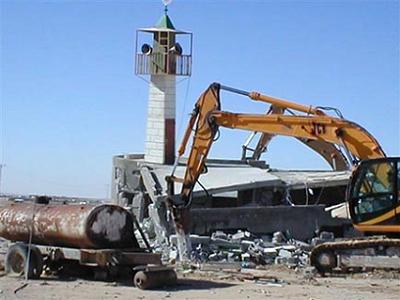
Bedouin residents of the Negev are gearing up to take last minute measures as the Israeli Knesset is slated Sunday to discuss a plan to forcibly relocate tens-of-thousands of Bedouin Palestinians.
The Prawer Plan was approved by the Israeli government in 2011 but shelved in 2013 amid widespread protest among Palestinians within Israel and international condemnation.
Israeli minister of agriculture Uri Ariel of the Habayit Hayehudi party (Jewish Home) has since reintroduced the plan to the Knesset .
Palestinian Bedouin MK Talab Abu Arar on Saturday urged a committee representing Bedouin residents of the Negev to have an emergency meeting to discuss preventive measures that could be taken to prevent displacement.
“We call upon our people to roll sleeves up and join the struggle,” Abu Arar said.
Approved without any consultation with the Bedouin community, the plan would evict nearly 40,000 Bedouins from their villages and force them to live in concentrated areas that critics called “reservations.”
Israel currently refuses to recognize 35 Bedouin villages in the Negev, which collectively house nearly 90,000 people.
Israeli Prime Minister Benjamin Netanyahu’s right-wing coalition pieced together last spring is largely made up of MKs notorious for supporting settlement expansion throughout the West Bank, at the expense and displacement of local Palestinians.
In May, Israeli Justice Minister Ayelet Shaked said that a High Court ruling to destroy the Bedouin village of Umm Hiran and replace it with Jewish housing was “not discriminatory,” according to Israeli media.
Shaked is also member to the Habayit Hayehudi party which conditioned joining Netanyahu’s coalition on reinstating the Prawer Plan.
UN officials have repeatedly called on the Israeli government to halt the plan.
Constant Threat of Demolition
While the Prawar Plan has yet to be instated, evictions notices in the E1 zone have already been issued, following a pattern of Israeli policies which regularly result in the displacement of Bedouin communities and demolition of their homes.
On Thursday, Israel’s Civil Administration delivered dozens of eviction and stop-work orders to Palestinian Bedouins living in Abu al-Nawwar east of Jerusalem.
The Bedouin residents were told that they must move to the Bawwabat al-Quds (Jerusalem Gate) area within a month.
The area is on the outskirts of Abu Dis where Israeli authorities plan to relocate Bedouin families currently living in the E1 zone, an area northeast of Jerusalem and west of the illegal Israeli settlement of Maale Adumim.
Israeli plans for settlement construction in the area have been strongly opposed by the international community, including the US.
Critics say Israeli settlement construction in E1 would divide the West Bank in two and make the creation of a contiguous Palestinian state virtually impossible.
In May, the Israeli Supreme Court approved military orders to demolish the Bedouin village of Susiya south of Hebron and relocate its 340 Palestinian residents, and registered 1,000 dunams (250 acres) of land belonging to a Bedouin resident under the name of the Israeli development authority.
“It is a sad day when Israeli Supreme Court decisions provide legal cover for forced evictions, as in the case of these two villages,” Sarah Leah Whitson, Human Rights Watch’s (HRW) Middle East and North Africa director said in a statement following the court decision.
According to HRW, there are thousands of Bedouins in Israel living in unrecognized Negev villages that are under constant threat of demolition.
The UN reports that 70 percent of Bedouin communities are refugees, driven from their land during the establishment of the state of Israel in 1948.
(Ma’an – www.maannews.com)





